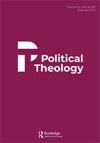Intimate Burdens: Addictive Debt and Productive Guilt
IF 0.4
0 RELIGION
引用次数: 0
Abstract
In this work, Elettra Stimilli extends her inquiry into debt initiated in her first book The Debt of the Living (SUNY, 2017). Both are important works and make significant, original contributions to philosophical reflection on debt. Debt and Guilt is written in a slightly more accessible manner for a wider audience but still grapples with sophisticated and complex concepts, moving the conversation forward from the claims, insights, and interventions made in Debt of the Living. Readers who find Debt and Guilt generative will be well served by working through Debt of the Living as well. I here focus on just two of the many striking analyses and arguments made in the text. Stimilli draws our attention to the status of addictus in Roman law. She describes a fascinating set of declarations in the Twelve Tables stipulating that if a debtor fails to repay their creditor, they undergo addictio, declared by the law as bound to and at the mercy of the creditor. The addictus enters a liminal state, remaining both a free citizen and one who is enslaved and subject to their creditor, who may seize their property, sell them to reclaim what is owed, or even cut them into pieces and portion out their parts for a price. The term addictus has meanings ranging from being devoted or assigned to being handed over or betrayed, and of course is the precursor to our modern notion of addiction. We can sense something of that etymology here, with the image of the debtor being bound and attached to the creditor, in a troubling intimacy reminiscent of the attachments we have to our addictions. Addictions are a kind of obligation, a sense of indebtedness to a force that requires our attention and labor. In the history of its usage, addiction also carried a positive connotation as devotion. As the seventeenth century divine, Thomas Fuller, declared: “We sincerely addict ourselves to Almighty God.” The history of usage blurs the lines between bond, enslavement, and devotion. And while the implication here is that the debtor, as addictus, is addicted to their creditor, in reality it is reversed: the creditor is the one who needs the debtor, much as the master needs the slave, as Hegel emphasized. The creditor is the addict. The myth of Addictus tells the tale of a slave released from their debt obligation, who had become so accustomed to their chains that they did not remove them. Indebtedness亲密负担:成瘾性债务和生产性内疚
在这部作品中,埃莱特拉·斯蒂米利扩展了她在她的第一本书《活着的债务》(纽约州立大学,2017年)中对债务的探究。两者都是重要的著作,对债务的哲学反思做出了重要的、原创性的贡献。《债务与内疚》以一种更容易理解的方式为更广泛的读者写作,但仍然努力解决复杂而复杂的概念,将对话从《活着的债务》的主张、见解和干预中向前推进。那些发现债务和内疚产生的读者也会通过阅读《活着的债务》得到很好的服务。在这里,我只关注文本中许多引人注目的分析和论点中的两个。斯蒂米利让我们注意到在罗马法中成瘾者的地位。她在《十二表法》中描述了一套引人入胜的声明,规定如果债务人未能偿还债权人,他们就会受到惩罚,法律宣布他们受债权人约束,受其摆布。成瘾者进入一种极限状态,既保持自由公民的身份,又被奴役,受制于债主,债主可能会扣押他们的财产,出售他们以收回欠款,甚至把他们切成碎片,按一定的价格分成部分。“addictus”一词的含义从“投入”、“被分配”到“被移交”、“被背叛”,当然,它也是现代“成瘾”概念的前身。我们可以在这里感受到这种词源,债务人被束缚并依附于债权人的形象,在一种令人不安的亲密关系中,让人想起我们对成瘾物的依恋。上瘾是一种义务,一种对一种需要我们关注和劳动的力量的负债感。在其使用的历史上,成瘾也有积极的含义,如奉献。正如17世纪的神学家托马斯·富勒(Thomas Fuller)所说:“我们真诚地把自己献给全能的上帝。”使用的历史模糊了束缚、奴役和忠诚之间的界限。虽然这里的暗示是债务人,作为成瘾者,对他们的债权人上瘾,但实际上是相反的:债权人需要债务人,就像主人需要奴隶一样,正如黑格尔强调的那样。债主是瘾君子。阿蒂图斯的神话讲述了一个奴隶从债务中解脱出来的故事,他已经习惯了自己的枷锁,所以他们不愿解开枷锁。负债
本文章由计算机程序翻译,如有差异,请以英文原文为准。
求助全文
约1分钟内获得全文
求助全文

 求助内容:
求助内容: 应助结果提醒方式:
应助结果提醒方式:


